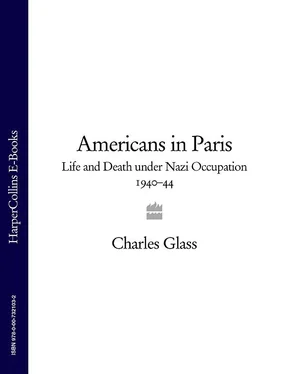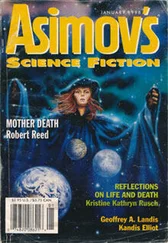Bullitt instructed Counsellor Robert Murphy, military attaché Colonel Horace H. Fuller and naval attaché Commander Roscoe Hillenkoetter to pay a courtesy call on General von Studnitz ‘as soon as he appeared to be settled’. When Murphy saw the Swastika rise on the roof of the Crillon, he decided ‘the moment had arrived for us to make our call’. Their purpose was to keep Bullitt’s promise to Premier Paul Reynaud to ensure a peaceful occupation. When the three Americans left the embassy that warm summer morning, a military convoy passed between them and the Crillon. One car stopped, and a German lieutenant asked in English, ‘You are Americans, aren’t you?’ They nodded. The lieutenant, who said he had lived in the United States, asked, ‘Can you tell us where we might find a suitable hotel here?’ Murphy laughed. ‘The whole city seems to be in your possession. It has hundreds of empty hotels. Take your pick.’
Inside the Crillon’s gilt lobby, Murphy saw a French police commissioner amid a throng of Germans. ‘You can’t imagine what happened,’ the man said. He told Murphy, Hillenkoetter and Fuller that a German colonel stopped him earlier that morning and ordered, ‘Open that hotel. It will be our headquarters. Take down the French flag from the roof, and replace it with this German flag.’ The empty hotel’s doors and shutters could not be opened, and the colonel warned, ‘If that hotel is not open in fifteen minutes and the French flag is not down, we will shoot it down and shoot you, too!’ A locksmith opened the doors in time, but the commissioner was still in a sweat.
‘Murphy!’ one of the German officers in the Prince of Wales suite upstairs called out. Murphy knew Colonel Weber from his years as US Vice-Consul in Munich. Weber, now von Studnitz’s aide-de-camp, welcomed the Americans, wrote Murphy,
as if we were all old friends, ushering us immediately into the drawing room where the general was talking with a dozen staff officers. We had expected to spend only a few minutes with the general, but he had previously ordered champagne from the Crillon’s excellent cellars and was in a mood to answer all the questions of our military and naval attachés. The only information we had about the progress of the war was what we had heard from western and Berlin radio broadcasts, which necessarily were confusing. General von Studnitz, who had served as German military attaché in Poland, said he appreciated it was the duty of attachés to gather intelligence for their governments and he was quite willing to inform us fully and frankly.
Von Studnitz gave the attachés a ‘clear and concise summary of the military campaign to date’ and predicted that ‘mopping up operations in France would not require more than another ten days, after which preparations would begin for crossing the channel to England’. Von Studnitz believed the British, without a single army division intact and most of their heavy artillery abandoned at Dunkirk, would not resist. Hillenkoetter asked how the Germans would cross the Channel, but von Studnitz ‘brushed aside this question with the comment that all plans were made’. The war, he added, would be over by the end of July, in six weeks. Walking the short distance back to the embassy, Murphy and the two attachés agreed that ‘none of us was at all sure he might not be right’.
Commander Hillenkoetter, recalling the same encounter, but without the champagne, wrote that ‘although it was only 10.30 a.m., we were offered a glass of what the General said was the very best brandy in the Crillon’. Hillenkoetter reported that von Studnitz was ‘most happy to make his call on the Ambassador at 1:30 p.m. as the Ambassador wished – assured us that all American property would be protected, and that we could count on the best of cooperation as far as the German military were concerned’. Von Studnitz invited Hillenkoetter and Fuller to attend the review of the Green Heart Division, the 185th Infantry, which he had once commanded, in the Place de la Concorde at 3.30 that afternoon. The two Americans could think of no polite way to refuse.
For Colonel Horace Fuller, the experience of handing Paris over to the Germans was galling. The 1909 West Point graduate had been briefing American and British journalists daily that the French Army would not hold. ‘Colonel Fuller was the only man in Paris who knew what was coming,’ Quentin Reynolds, the Collier’s Weekly correspondent, wrote. ‘He advised us to make plans to get out. He told us “off the record” that the French Army wouldn’t even bother to defend Paris.’ Fuller’s astute observations contrasted with the French government spokesman’s reply to a question from Virginia Cowles, the attractive American correspondent of Britain’s Sunday Times , asking whether Paris would be declared an ‘open city’: ‘Never,’ he said. ‘We’re confident that Hitler’s mechanized hordes will never get to Paris. But should they come so far, you may tell your countrymen we shall defend every stone, every clod of earth, every lamp-post, every building, for we would rather have our city razed than fall into the hands of the Germans.’ Colonel Fuller had fought the Germans in the Great War, when he commanded the US 108th Field Artillery Regiment in the Meuse-Argonne and Ypres-Lys offensives. Clare Boothe, covering the invasion for Life magazine, asked Fuller ‘what’s going to happen’:
His hands trembled. His eyes were quite bloodshot from loss of sleep. He tried to smile, but he couldn’t. He said, ‘Oh, there’s hope of course – the morale of the French – we can deliver 1,000 planes a month soon.’ ‘Oh,’ I said, ‘don’t talk morale and economics, talk WAR. What do you think?’ He said so wearily, ‘I don’t want to think any more, I want to use my heart. You see, I want them to win so much, so very much,’ he said. ‘I fought with them at Chateau-Thierry in the last war – and oh, they’ve been Goddamn dumb, but dear Christ I love them.’
Back in his office at the chancellery, Murphy saw German soldiers climbing over the embassy gate: ‘They were running a telephone wire across our courtyard to the Crillon Hotel.’ To Murphy’s shock, the embassy’s ‘picturesque colored doorman’, George Washington Mitchell of North Carolina, was helping them. Mitchell had come to Paris before the Great War as a rider in a cowboy and Indian show. Murphy, who knew Mitchell was married to a German woman and spoke German, demanded to know why he had disobeyed orders not to allow German troops onto embassy premises. Mitchell said the soldiers were from Hamburg, where he knew people, and were ‘nice fellas’. Bullitt reacted with fury, not at George Mitchell, but at the Germans. He sent word to von Studnitz to remove the telephone cable at once. Henceforth, any German soldier breaking into the embassy grounds would be shot. The Germans removed the wire, but they posted a sign in front of the embassy that said, ‘ Amerikanische Botschaft ’, ‘American Embassy’. It was one of hundreds of signs the Germans affixed all over Paris for their troops and the German civilians, both administrators and tourists, who would arrive in their wake.
Von Studnitz, recalled Hillenkoetter, came to the embassy on time at 1.30 p.m. and spoke with Bullitt for about ten minutes ‘of correctness’. An hour later, Hillenkoetter and Fuller accompanied Bullitt for a similar, formal session at the Crillon. At 3.30, as promised, the two uniformed American attachés met General von Studnitz in the Place de la Concorde. With Nazi newsreel cameramen poised to record the military march-past, von Studnitz invited them to join him on the reviewing stand. ‘Both Fuller and I could easily see how that would look in newsreels, photos, etc. – two American officers taking a review with a German general. So we hastily, but firmly, declined, saying that we didn’t feel worthy to share the General’s honor; that it was his division and his glory; and that it would be a shame to deprive him of even a share of the glory.’ Fuller and Hillenkoetter diplomatically disappeared into the crowd. Robert Murphy, however, stood uncomfortably beside the German generals as the Green Heart Division goose-stepped across the great square to thumping martial music. When the parade ended and Murphy was walking back to the embassy, he complained to New York Herald Tribune correspondent Walter Kerr, ‘The general wanted the ambassador, and the ambassador told me to take his place.’ From an upper window of the embassy, a young diplomat hired locally in Paris, Keeler Faus, surreptitiously took photographs of the German troops in the Place de la Concorde.
Читать дальше












